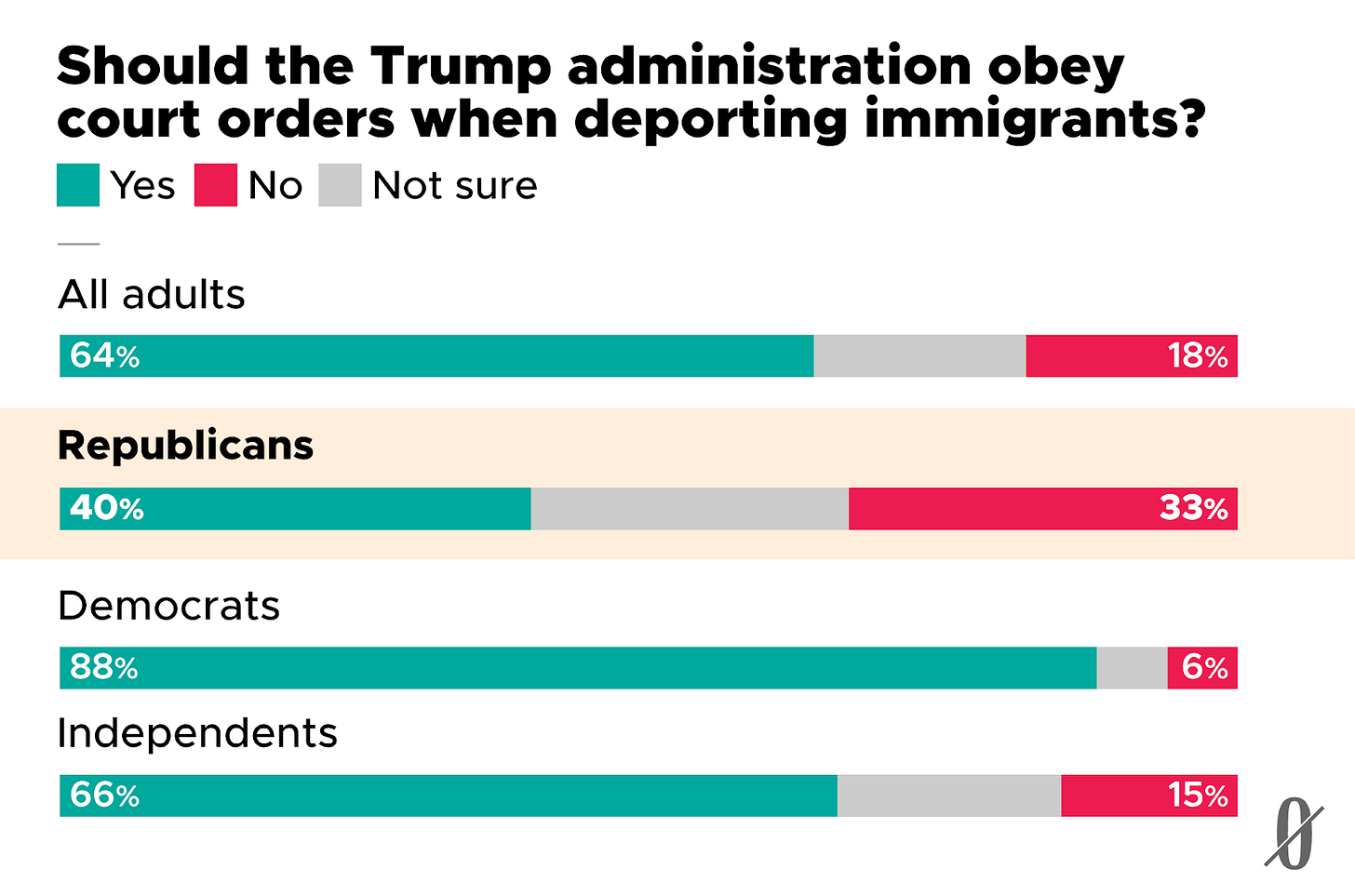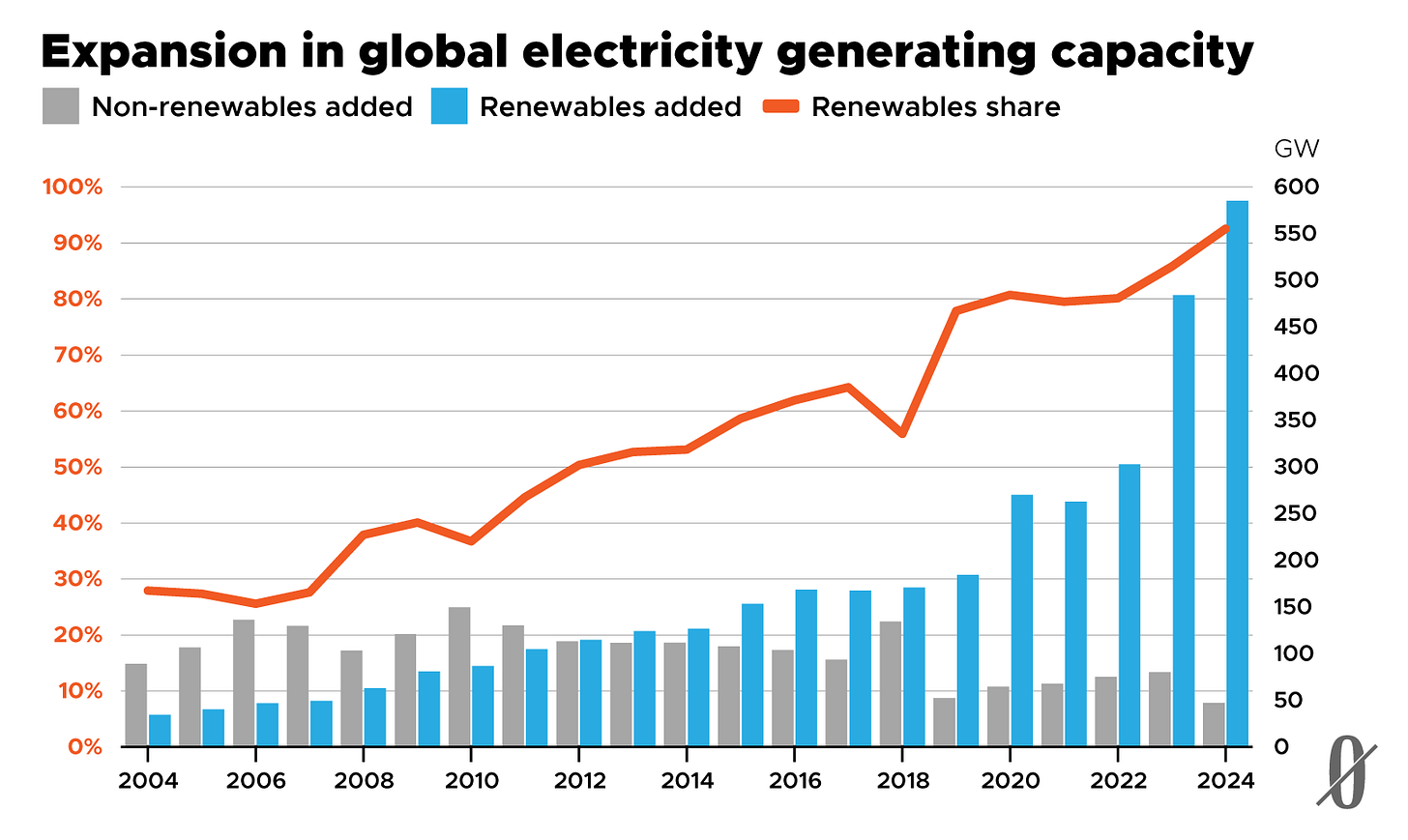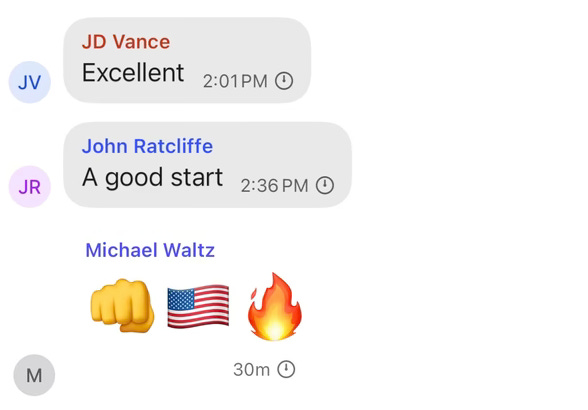The Untold Stories of the Signal Snafu
Plus: East Asia escalation, AI loners, not-so-damning evidence, good(ish) climate news, and more!
Save the date: I’ll be doing a livestream Friday, April 4, starting at 1 pm US Eastern Time, with former NZN staffer Nikita Petrov and friend-of-NZN Boris Shoshitaishvili. Details below, but the TLDR is that we’ll talk about the weird state of the world (quite possibly in some weird ways), and we’ll take questions during the second half of the two-hour chat. In addition to saving the date, you can save the link to the livestream.
—Bob
—US officials told Syrian officials that America will partially lift sanctions on Syria if, among other things, the country destroys its chemical weapons stores and commits to cooperate with Washington on counterterrorism. US sanctions have prevented Qatar from sending money to the new regime and have made it impossible for Syria to import much of the machinery needed to rebuild in the wake of its civil war.
—Three-quarters of Republicans say the Trump administration should continue to deport people under special wartime authority despite a court order that halted the expulsion of Venezuelans under that authority, according to a poll from Reuters and market research firm Ipsos. A similar poll from YouGov and the Economist found that 40 percent of Republicans believe that, in general, Trump “should obey court orders when deporting immigrants,” while 33 percent say he should ignore them.
—A study conducted by researchers from MIT and OpenAI found that the more time people spent talking to chatbots, the more likely they were to feel lonely and the less likely they were to spend time with other humans. However, the structure of the study left open the possibility that these results say more about the kinds of people who choose to use chatbots extensively than about the effects of extensive use.
—Good news: Global renewable energy capacity grew by 585 gigawatts in 2024, marking a record 15.1 percent increase over the year before, according to a new report from the International Renewable Energy Agency (IRENA). Bad news: That pace still leaves the world on track to miss the COP28 goal of tripling renewables between 2023 and 2030.
—Gene testing company 23andMe has filed for bankruptcy and begun seeking new ownership, prompting fears about what a buyer might do with genetic data from more than 15 million users. While 23andMe says the data will be protected, some users are skeptical, in part because the company’s current financial straits stem from lawsuits over a hack that revealed personalized information about nearly half of the company’s customers.
It’s the kind of story that’s almost too good to be true. On Tuesday, the Atlantic revealed that National Security Adviser Michael Waltz had added Jeffrey Goldberg, the Atlantic’s editor-in-chief, to a group chat in which top US officials were discussing, and debating, planned airstrikes against the Houthis in Yemen. Goldberg, who says he initially doubted that the text chain was real, stayed in the conversation for four days without anyone seeming to notice.
Mainstream coverage has largely focused on whether the participants in the chat were using a proper channel—in this case, the messaging app Signal—for sharing classified war plans, and whether Waltz should be fired for the breach. (How about: “No” and “Sure—why not?”) The substance of the messages, however, has gotten significantly less attention, so we thought we’d break down four underemphasized aspects of one of the more unusual stories of Trump’s second term.
1) The flippancy of the conversation
Most movies and tv shows portray Pentagon planning as a solemn affair—one in which the participants carefully assess the value of military goals and weigh that against the cost, including the human toll of collateral damage. Not so with the Signal group chat. Defense Secretary Pete Hegseth’s primary concern appears to be messaging, which he says should focus on how “Biden failed” to stop the Houthis. The only concern expressed over collateral damage comes from Vice President JD Vance, who urges the group to take whatever steps are needed to “minimize risk to”—you guessed it—“Saudi oil facilities.” When Waltz announces that the operation brought down a residential building, Vance simply responds, “Excellent.” Waltz then sends a string of emojis that has become one of the more indelible images from the chat:
2) Who got hit by the strikes
The bombs appear to have hit a lot more than their intended targets. In one text, Waltz says the US bombed the Houthis’ “top missile guy” after getting a “positive ID of him walking into his girlfriend’s building”—a building that, Waltz adds, has “now collapsed.” The Yemen Data Project, an independent watchdog whose analysis of Yemen’s civil war has been widely cited, reported Wednesday that this first strike killed 13 civilians and injured nine others. Subsequent attacks killed at least 12 more civilians, meaning that about half of the known deaths so far have been civilians. The Yemen Data Project also reports that the US hit a school, a wedding hall, and the Al-Rasool Al-Azam Oncology Hospital. The strikes came less than two weeks after Hegseth axed the Pentagon office in charge of preventing civilian harm.
3) The not-so-new approach to the Middle East
In the chat, Hegseth argues that the airstrikes will allow the White House to “Reestablish deterrence, which Biden cratered.” So far, though, it looks like the Biden playbook all over again.
It’s been about 18 months since the Houthis started lobbing missiles at merchant ships in the Red Sea, an effort intended to pressure Israel to end the war in Gaza. The Biden administration launched a similar campaign of attacks against Houthi missile launch sites, but the Houthis kept up their attacks all the same.
The Trump administration seems to think that it can fix things by just bombing harder. “[W]e have a fundamental decision of allowing the sea lanes to remain closed or to re-open them now or later,” Hegseth argued. But, as many military analysts point out, nothing short of a ground invasion is likely to stop the famously resilient Houthis. And even that could be harder to pull off than many people think, as Saudi-backed forces in Yemen can attest.
As we noted last week, there is good reason to believe that pushing Israel to end the war in Gaza would also lead the Houthis to stop their attacks on ships. But judging by the Signal chat, seeking peace in two war-torn areas, rather than amping up the killing in both of them, is an unthinkable option.
4) Goldberg’s checkered past
Goldberg deserves credit for disclosing nearly all of the texts contained in the Signal chat. But mainstream media deserves criticism for its starry-eyed portrayals of Goldberg’s journalistic career.
In a mini-profile published on Tuesday, the New York Times runs through Goldberg’s background as a national security reporter and highlights his role as boss of the Atlantic, which has expanded its impact and won several Pulitzer Prizes under his leadership. Missing from this account—and relevant to the question of how Goldberg wound up on that Signal chat—is the fact that he has consistently and influentially supported the aggressive use of force in the Middle East. And he has sometimes done that via dubious journalism.
The most notable example came during the run-up to the 2003 invasion of Iraq. In a 2002 New Yorker piece that made a splash, Goldberg offered what he considered plausible evidence of a link between Iraqi dictator Saddam Hussien and Al Qaeda—an allegation that, coming only six months after the 9/11 attacks, provided uniquely powerful rhetorical support for invasion. Goldberg’s key source—a man known as Muhammad Mansour Shahab or, sometimes, as Muhammad Jawad—was later shown to be a fabulist, and to have lied about specific details involved in Goldberg’s story. This wasn’t altogether shocking, as Goldberg had been led to this source by Kurds who had an obvious interest in encouraging regime change in Iraq.
Less than two months before the invasion, Goldberg wrote a second New Yorker piece about the possibility of a Saddam-al Qaeda link, this time quoting (unreliable, it turned out) Bush administration sources—and generating another round of publicity about the alleged link.
After the Iraq War, Goldberg focused his threat inflation skills on Iran—an endeavor that led New York Times columnist Roger Cohen to refer to him as Bibi Netanyahu’s “faithful stenographer.” In the case of Yemen, Goldberg has put his stenographic skills to less pernicious use; the threat inflating had already been done by the time he joined the conversation.
Over the past few months, we at NonZero have spent a lot of time focusing on day-to-day issues in politics and foreign policy. But long-time NZN readers know that we also try to keep an eye on the big picture. And when we say big, we mean big—like the psychology of tribalism, the mind-body problem, the meaning of life, the possibility of higher purpose, the possibility that humankind is building a giant global brain whose neurons will be AIs. And so on.
It’s in this spirit that we’ve decided to put together a special YouTube live stream next Friday (April 4) at 1 pm with two of our most cosmic-minded friends: Nikita Petrov, a former NZN staffer and the publisher of the Psychopolitica newsletter; and Boris Shoshitaishvili, a fellow at the Berggruen Institute whose scholarly work focuses on the Earth sciences, globalization, and collective identity. Joining Nikita and Boris will be NZN editor-in-chief Robert Wright.
The goal of the conversation is to exchange ideas that seem meaningful at this peculiar moment in world history—ideas that, we hope, could help shape a shared understanding of our role in this cosmic tumult. And when we say “our,” we’re referring both to the thousands of subscribers to this newsletter and, more ambitiously, to the human species as a whole (and if that's not ambitious enough, to the planet, or Gaia, or the cosmos, or consciousness itself).
We'll spend the first hour talking among ourselves and the second taking calls from the audience, in hopes that you'll be inspired to share your world-shaping ideas as well. If this first stream seems promising, Nikita and Boris will work on turning this into a regular feature. You can hear them discuss their vision here.
It has been said—in this newsletter, in fact—that artificial intelligence is crying out for international governance. It has also been said—on the op-ed page of a major newspaper—that such governance is so important as to warrant a major reorientation of American foreign policy, a determined effort to mend relations with China so the world’s two AI superpowers can coordinate on policy. But these things haven’t been said by an internationally famous, multiple-Pultizer-Prize-winning New York Times columnist—until now.
In a significant upgrade to elite MSM discourse on AI, Thomas Friedman argued this week that history’s verdict on Donald Trump and Xi Jinping will rest, above all, on whether they “collaborate to create a global architecture of trust and governance over these emerging superintelligent computers, so humanity gets the best out of them and cushions their worst.” Friedman believes that “what Soviet-American nuclear arms control was to world stability since the 1970s, US-Chinese AI collaboration” will be “for the stability of tomorrow’s world.”
Friedman is basically a techno-optimist, but he says it will take vigilance to keep AIs from “being used by rogue actors for globally destabilizing activities or going rogue themselves.” And “millions of people possibly losing their jobs and dignity at the same time is a prescription for disorder.”
Friedman implicitly dismisses the view (held by, for example, Anthropic CEO Dario Amodei) that the US should band together with other democracies, cut China off from critical technology, and use the resulting AI advantage to dominate autocratic nations. He writes about the international regulation of AI: “There was a time when many people thought that such a project was something only a coalition of democracies could do—and then present it to the world. Sorry, too late. China has greatly narrowed the gap with us and surpassed the other democracies. This can’t be done without Beijing.” (Tom discussed China and AI policy on a recent NonZero podcast.)












